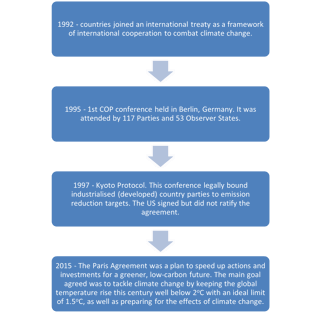Introduction
Every year, leaders (or their country’s representatives) from around the world gather to discuss issues surrounding one of the biggest issues facing humanity today: climate change.
The Conference of the Parties (COP) serves as a global summit, bringing together nearly every country to negotiate new measures, and review progress toward the overarching goal of the United Nations Framework Convention on Climate Change (UNFCCC): limiting climate change.
The UNFCCC is an agreement between 198 parties (197 States and the EU) to stabilise greenhouse gas concentrations ‘at a level that would prevent dangerous anthropogenic (human-induced) interference with the climate system’.
Despite their importance, their effectiveness has been the subject of increasing debate. Some argue that while COP summits have led to landmark agreements like the Kyoto Protocol and the Paris Agreement, their progress can be slow and often falls short of what is needed to combat the climate crisis.

Brief history of COP

Achievements of COP
The COP summits have been instrumental in forging landmark agreements among nations to address the causes and impacts of climate change. These gatherings offer a unique platform where countries can set aside differences to collaborate on creating a better future for everyone.
Since being established, COP meetings have achieved significant milestones. For example, the 2007 Bali conference (COP13) established a roadmap to replace the Kyoto Protocol, ensuring that all countries - not just wealthy ones - would be committed to legally reducing their carbon emissions.
The Cancun conference of 2010 (COP16) made strides in supporting developing countries by creating the Green Climate Fund, aimed at helping them implement climate actions.
COP23, held in Bonn in 2017, broke new ground by amplifying underrepresented voices within the climate conversation. It introduced the Talanoa Dialogue Platform to promote the inclusion of indigenous communities and adopted a Gender Action Plan to strengthen women’s roles in climate-related decision-making.
COP28 in Dubai (2023) marked a pivotal moment as the first opportunity to assess how countries are fulfilling their commitments under the 2015 Paris Agreement.
Challenges of COPs
Meeting the diverse needs and expectations of nearly 200 nations at a COP summit will always have its challenges. Each nation and state bring its own priorities and agenda, and while the hope is that politics can be set aside to address the shared crisis of climate change, it inevitably plays a role.
For example, COP28 and COP29 were hosted by the UAE and Azerbaijan - nations whose wealth has been built largely on carbon-based economies. This raises questions about the appropriateness of such hosts for a conference focused on combating climate change. Although it is unfair to ask these nations not to utilise their natural resources to develop without offering an equally lucrative alternative, statements like Azerbaijan’s President Ilham Aliyev referring to oil and gas as a "gift from God" during the COP29 opening ceremony seems at odds with the spirit of the summit.
Controversy has also arisen over holding summits in countries with limited experience in navigating the complexities of climate negotiations, particularly around financing. COP29, for example, faced criticism from several climate leaders for being poorly organised, with some going as far as to label the event "not fit for purpose".
Recognition that emerging and developing countries are set to become the largest emitters in the coming decades, it is not clear how they can be funded to support the transition away from carbon-intensive development. For these countries to meet the terms set out by the Paris Agreement, vast sums of money need to be invested into them. It is largely agreed that some of this income should come from more developed nations, however, there is little consensus on how much individual countries should contribute, creating an ongoing issue in sourcing finance for a more sustainable solution.
Finally, the role of the United States, as a global superpower, is often pivotal. Its engagement (or lack thereof) has a profound impact on global climate efforts. Historically, the US has been inconsistent in its commitment, only joining the cause more actively after the Paris Agreement. With shifting political landscapes - Democrats generally championing climate action and Republicans showing less support - US climate priorities tend to fluctuate. As the second Trump administration takes office, concerns mount globally over potential delays or rollbacks in US-led climate initiatives.
So, are COPs effective?
COPs serve as a platform which, in theory, all nations, states and people can voice their concerns on the climate crisis as well as work together to find mutually agreeable solutions. They represent one of the few opportunities for global collaboration on an issue that affects every person on the planet. However, despite efforts to improve representation, certain voices remain louder and more influential at the table.
As with all collaborative initiatives, it is striking the balance to ensure that all parties are satisfied with its progress that is the main challenge facing the COP summits.
Therefore, COPs, as a concept work well but, arguably, there are changes still to be considered to their current format to ensure that the original intentions of future summits are met.
Further reading
File nameFiles
File type
Size
Download



